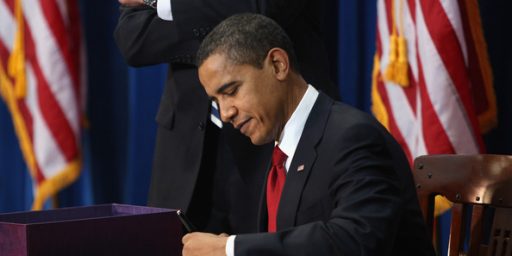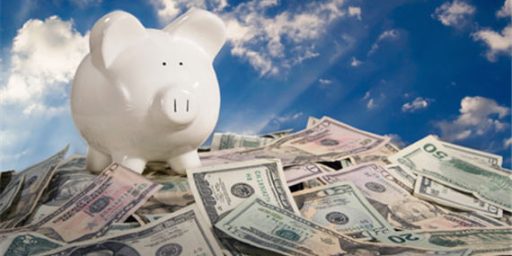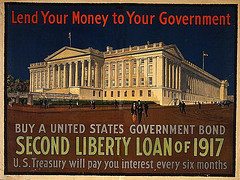Hillary’s Anti-Market Bias
Over at Reason Online Steve Chapman outlines the problems Senator Clinton has with markets.
Obama, by contrast, acknowledges the bitter truth that when government regulators clamber into a carriage, it can easily turn into a pumpkin.
Their approaches to the problem are not an aberration but a symptom of a larger difference. Obama is not a staunch free marketeer, but he grasps the value of markets and shows some deference to economic laws. Clinton, however, tends to treat both as piddly obstacles to her grand ambitions.
You don’t have to take that from me. Some on the left see the Illinois senator as suspiciously unenchanted by their goals and methods. Robert Kuttner, an economics writer and co-editor of The American Prospect, scorns Obama’s advisers as “free-market guys who want to use markets to somehow solve social problems, which is like squaring a circle.” New York Times columnist Paul Krugman denounced Obama because his health care and fiscal stimulus plans “tilted to the right” and concludes he is “less progressive” than Clinton.
If it came down to it, I’d rather have Obama than Clinton, and for that matter I’d rather have Bill Clinton as well. With Senator Clinton I see her as arrogant, in that she knows what is good for other people and will force that view on them. One of the things Senator Clinton said over three years ago still sticks with me,
“Many of you are well enough off that … the tax cuts may have helped you,” Sen. Clinton said. “We’re saying that for America to get back on track, we’re probably going to cut that short and not give it to you. We’re going to take things away from you on behalf of the common good.“–empahsis added
Sounds great, but I always wonder how far people will go in pursuit of the “common good”. Senator Obama seems to understand that there is a limit, I’m less convinced that Hillary understands this. I have to say, I hope Senator Obama wins the nomination…I might actually find myself considering voting for the Democratic candidate.





It might be an age thing as much as anything. Has Hillary Clinton ever taken an economics course? If she did, it was without doubt during the era when Keynes and Galbraith dominated the discussion, the word “rent-seeking” hadn’t been coined, the word “externality” wasn’t in common use, and the words “subsidy” and “tax” were extremely prominent.
In three years of economics courses I don’t think I heard the word “incentive” more than a handful of times.
Besides the assertion in the article, what real world actions would lead you to believe that Obama has any grasp of the market? I’m not being snarky, I really don’t see it. If it is there, then I would like to know that.
I always find it rather hilarious that someone can make an egalitarian argument about the current distribution of income and wealth.
The stones it takes to make this argument is awe inspiring.
Top marks, guys. Top marks.
Hal,
Longing for the old Soviet Union, eh? Maybe you should head down to Chavez’s S. America. I hear he wants a better, more fair distribution of income and wealth. Right up your alley. But you know what? Here in the good ole USA we have a capitalistic system. Like no other in the history of planet Earth. Children prosper, even the indigent get fat and everyone has a cell phone and cable. If you’re poor you don’t get to go to Disneyland every month but a 2 pack-a-day habit is easily in reach. And here it is against the law to limit how much income someone can make (something about being contrary to “freedom”)
Hal, if you are so worried about income distribution, maybe you should give away a larger portion of yours. Oooooh couldn’t do that now could ya?
Oooooh couldn’t do that now could ya?
I’ve probably paid more in taxes than most will earn in their lives, so I don’t really think I have anything to fear from this juvenile gambit of yours. A gambit so transparently stupid, I might add, that it’s been easily dealt with when McMegan – her nibs, as she’s known around the libertarian circles – made an ass out of herself when she used the same line of reasoning.
In any event, amusing as it may be to have one such as yourself try to box me into a communist, wealth spreading stereotype, suffice it to say that I’m a full blooded capitalist who has fully participated in the market in the form of both worker and entrepreneur. It doesn’t take a communist to look at – oh, I don’t know – the huge bailout of the whole subprime mess to understand the obvious fact that our system is hardly a free market and is principally set up so that the masses pretty much bail out the rich whenever they make stupid decisions – rather than have the market work its wonders and slap them into the next parallel universe when they do something so monumentally stupid.
Anyone with a modicum of economic insight can see the massive socialized bailout of global industries happening before our eyes. A bail out, I might add, which far outstrips any mad redistribution scheme of Chavez, Castro or any of your other communist/socialist boogeyman you might want to throw out in a rather silly attempt to argue by innuendo.
Further, when you see the people responsible for this mess which literally threatens to – at minimum – plunge the country, if not the entire world economy, into a recession make off with hundreds of millions in bonuses for the “heckuva job” that they did getting us into this mess, not to mention the government subsidized bonus in the form of vastly lower taxes on their earnings from these fiascos, one has to seriously wonder what planet you must be from to think that this is a “market” in any realistic meaning of the term.
But then, you’re not here for a discussion, are you Chris.
Sorry, Hal. Your confusing comment above was, well, confusing.
Are you a liberal? Conservative? Libertarian? Hard to tell. Most Libertarians these days are wacko, liberals are wholly lacking in any semblance of intelligence, and conservatives generally aren’t really conservatives.
Plus, IMHO, saying u r an independent is a cop out.
I’m a liberal. I thought that was quite clear.
I gotta admit I couldn’t make sense out of Hal’s post either. Nothing personal it was just one of those too short statements that left me scratching my head. I sometimes post them too.
I have to agree with Hal about the big bailouts. Now keep in mind I’m a conservative and he’s a liberal so if we both see problems then something stinks. There must be a better way to address the failures than rewarding many of the people who created the mess. Even the home buyers losing their houses have some responsibility. But do we ignore it and let it damage other segments of the economy?
I have to disagree with Hal on some other things. Chavez and Castro are more than figments of our anti-communist imaginations. Chavez is ruining a country as we speak and Castro spent the last 50 years doing the same. While we do have some socialist tendencies we have enough capitalism to water it down and keep things growing. The fact is we will never be 100% capitalist or free market but we should always be cognizant that’s a goal to reach for. Politics and politicians will push us towards the socialism we all fear. Somewhere in the middle is where we will reside.
We should also recognize the sub-prime bailout as relatively minor socialism compared to the social security system and Medicare. That’s some real wealth transfers there.
Both Obama and Clinton are full of campaign rhetoric. What they say matters little, it’s what they have done that will expose their positions. I have no faith in either of them to do the right things for the economy.
Where is this bail out? I suppose you could argue that the fed dropping rates constitutes a bail out. Perhaps Freddie and Fannie having loan limits raised.
Other than that the “stimulus” bill is a hand out to low and middle income earners, regardless of their mortgage situation. Freezing resets is a salve for primarily middle class folks that made poor decisions.
Hundreds of mortgage companies have gone out of business. Wall Street has laid people off from their mortgage, bond and SIV areas. Banks profits are suffering and consequently the shareholders are suffering. If you own Citigroup is the government offering you $50 a share as a bailout?
Where is this bail out?
Well, dropping the rates is a stunningly huge bailout. And there’s a host of other things going on as well, such as the high tens of billions “injected” into the industry through the discount window and through the buying of mortgage-backed securities – I think that’s around 130 billion. Then there’s the 200 billion or so stimulus package that was just okay’d by congress and Bush. Then there’s the rather entertaining mortgage rate freezing shenanigans combined with the resetting of the level of government insurance of jumbo sized loans which probably adds up to a hundred billion or more at least. And we’re just getting started, seeing as how the bond insurers are now being carved up and who the heck knows what the fallout from pulling those sticks at the bottom of this jenga pile will cost.
So, I would say that conservatively, we’ve probably put close to a half a trillion dollars into this mess so far depending on how you look at it. I’d have to do some serious research to pull together all the strings to get a clearer picture – one that probably not many people have at this point, given the way this mess is intertwined with derivatives.
Maybe it’s just me, but that’s some serious wealth distribution – and we’re just getting started.
But I guess everyone’s okay with saving the rich. I mean, McCain’s youthful indiscretion in the Savings and Loan fiasco of the 80’s cost us around a half a trillion in 1980 dollars (can’t figure what that is in current dollars due to our lovely falling currency n’ such – need a calculator).
But hey, he’s mister fiscal discipline now.
Hal,
How can you be both a capitalist and a liberal? Oil and water, man. Oil and water.
By the way, if you hate it here so much (where you have supposedly made a lot of money according to you) why don’t you simply move away? Go be with your buddy Chavez.
Go be with your buddy Chavez
Yea, this schtick of yours really just keeps getting funnier the more you use it.
Too bad it really isn’t funny. Your lib candidates Clinton and Barrack Husein Obama are socialists at heart. If you think (the supposed) bailouts of big business are bad, try bailing out millions of lazy liberal Americans in a Robin Hood scheme to shock the ages. Thats the democrat way. Thats the Chavez way. That was the Soviet way. It doesn’t work, and we might have to learn the lesson yet again.
Hal,
You keep saying it’s a bail out for the rich. Politicians are scrambling to bail out people that screwed up taking out mortgages they couldn’t afford. Additionally they want to get the votes of the people that feel the people defaulting on their mortgages are victims.
I completely agree that it will fail. As for wealth destruction, it is already taking place as prices adjust in housing. The only way it can be avoided is by the Fed pushing the bubble into another asset class as with internet stocks to real estate.
Politicians are scrambling to bail out people that screwed up taking out mortgages they couldn’t afford
What’s actually happening – and what’s terrifying to the people holding these loans – is that the people are simply mailing the keys to the house back to the lender and bailing on the loan. Thanks to the changes in the bankruptcy laws, it’s in the debtor’s interest to simply walk away. So now you have all these companies holding the bag on houses that are deflating in value at a frightening rate.
Point is, the bailout isn’t for the people taking out the mortgages – it’s for the people who’d be left holding the bag.
Additionally they want to get the votes of the people that feel the people defaulting on their mortgages are victims.
Perhaps, but really now. Isn’t “getting votes” pretty much the defining aspect of politics? It’s like saying that “your lungs only breath to exchange oxygen and carbon dioxide”. Sneering at it seems rather odd. But that’s probably just me 😉
The only way it can be avoided is by the Fed pushing the bubble into another asset class as with internet stocks to real estate.
We’ll see how successful that will be. We could literally see multiple trillions of dollars vanish in a puff of CDOs and SIVs in the next year alone. Already, here in CA, we’re starting to see the fallout as this spreads beyond the individuals to cities and then to states and then…
Oh, I forgot, there’s the 45 TRILLION dollar CDS pile which is pretty much the next rather large set of dominoes beginning to fall. If that shit goes, the global economy is going be knocked back to the 1400’s.
Pay particular attention to this graphic, as it gives some context to the sheer scale of the problem.
Hal,
I wasn’t saying the current distribution of income was egalitarian. In fact, I challenge you to point out where I said as much. Perhaps your comments would carry more weight if you wouldn’t impose your own delusions on what other people write.
I happen to think that a certain amount inequality is necessary, but then again that goes back to the notion of incentives that Dave Schuler mentioned. Really, try looking at Laffont and Martimort’s text on incentives.
Hal,
As much as 45 trillion sounds scary, bear in mind that the vast majority of the underlying credit of these swaps is sound. Much more importantly, you’ll want to be highly skeptical of any notional numbers related to swaps and derivatives. In the case of swaps, at the very least, notional value is twice the actual economic value since both sides are counted. This would be like counting both the lender’s and the borrower’s side to calculate total loan value. It is far more than a simple double count, however. These swaps have a lead bank and then lay of the risk immediately (already prearranged at the time of the swap).
To point out the general absurdity regarding notional numbers reported by the press, in the case of plain vanilla, exchange traded puts and calls, the notional numbers are calculated by assuming both the puts and calls are “in the money”. That of course is impossible.
As much as 45 trillion sounds scary, bear in mind that the vast majority of the underlying credit of these swaps is sound.
Funny, that’s *precisely* the same thing that they said about the CDOs. And I do mean *precisely*.
Again, who knows and I’m certainly not going to make the mistake of saying that because they were wrong about the subprime mess (shorthand for far more than subprime, mind you), they’re going to be wrong about the CDSs.
But just let me point out that it certainly doesn’t give anyone comfort to hear the same bromides tossed out.
That of course is impossible.
Yes, that’s true. Still, it’s fun to see those numbers that – if true – would suck up all the wealth in the known ecoverse. Just a perverse sense of greek tragedy, that’s all…